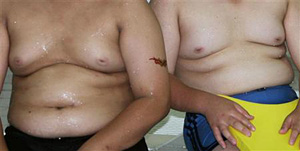 |
 |
 |
 Health & Beauty | August 2006 Health & Beauty | August 2006  
Scientists Take Step Toward Obesity Vaccine
 Amy Norton - Reuters Amy Norton - Reuters


| | Children sit on a pool side during a summer camp for overweight children which organised by Gangseo district office, in Seoul July 28, 2006. In what could become a new weapon in the battle of the bulge, scientists on Monday reported initial success with an experimental vaccine for obesity. (Reuters/Kim Kyung-Hoon) |
In what could become a new weapon in the battle of the bulge, scientists on Monday reported initial success with an experimental vaccine for obesity.

The researchers found that when they gave rats a vaccine against a "hunger hormone" called ghrelin, the animals were able to live the dream of eating what they wanted without packing on body fat.

The findings, published online by the Proceedings of the National Academy of Sciences, suggest a whole new approach to weight loss.

It's a long way, however, from success in rats to similar results in people.

More research in animals and more data on safety will be needed before an obesity vaccine is widely tested in humans, according to Dr. Kim Janda of the Scripps Research Institute in La Jolla, California.

One of the next steps will be to see whether ghrelin vaccination helps already obese rodents shed pounds, Janda told Reuters Health. If a vaccine were to become a reality for humans, it would be aimed at those obese individuals who continually "yo-yo" through diet and exercise, he noted.

Secreted primarily by the stomach, ghrelin is one of the hormones that help regulate appetite, metabolism and weight. Ghrelin levels rise before a meal, putting the brakes on calorie burning and fat breakdown, then decline after a person eats. The hormone promotes weight gain and fat storage.

Janda and his colleagues aimed to decrease the hormone's activity with an anti-ghrelin vaccine. To do that, they created three ghrelin-recognizing antigens - proteins that elicit an immune reaction.

When Janda's team administered their antigens to rats, they found that two of the antigens were able to bind to the active form of ghrelin, which then triggered the animals' immune systems to produce antibodies against the hormone.

"We're training the immune system to recognize ghrelin," Janda said.

This immune reaction apparently had effects on the animals' metabolism. Despite having free access to food and eating as much as their unvaccinated mates, the immunized rats gained less weight and boasted leaner, less flabby physiques.

That the weight effects came without diet changes was a surprise, Janda said. It means that the ghrelin vaccine acted on metabolism, and not appetite, he explained.

"They were eating the same, but still losing weight - which is pretty cool."

Still, the human body's control of hunger, metabolism and weight is very complex, Janda noted. A highly integrated system involving the brain, nerves and numerous hormones strives to keep body weight stable, especially when calorie intake drops - a fact that "wasn't a problem" back in the hunter-gatherer days of scarce food supplies, Janda pointed out.

Whether a ghrelin vaccine can safely and effectively alter this system remains to be seen.

SOURCE: Proceedings of the National Academy of Sciences Early Edition, online July 31, 2006. | 
 | |
 |



